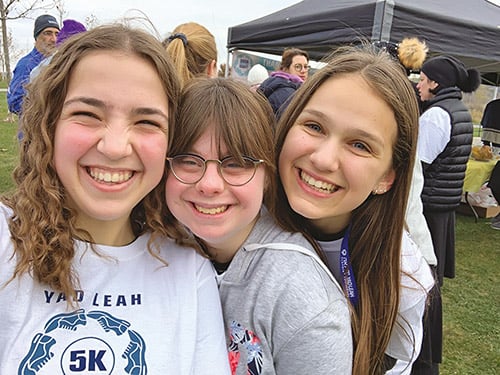


If I told you that my friend FaceTimes me when she’s bored and fills me in on her day, you might think she’s like any other phone-loving teenager. If I said she has super-trendy glasses and bangs I wish I could sport myself, you might assume she’s interested in fashion. If I explained that we see each other every week, and love hanging out, you might ask if we go to school together.
But from what I told you, I don’t think you would guess that my friend has Down syndrome.
I met Tova when I was a ninth grader at Ma’ayanot High School; she was at SINAI at Ma’ayanot. One of the amazing things about SINAI is that although the students take different classes from the Ma’ayanot students, we all mix together in the halls, at programs and chagigot, and at social activities. SINAI runs a program called Lunch Buddies, and if you opt to participate, you are paired with a SINAI student and eat lunch together once a week. That first year, Tova had been matched with a friend of mine, but when I was a sophomore, I decided to sign up for Lunch Buddies as well.
The genuine friendship Tova and I built during Lunch Buddies was never something I anticipated at the start of the program. Truthfully, I wasn’t sure what we could do to fill that 41-minute lunch period every single week. After exhausting all conversation starters that began with, “So what’s your favorite kind of …,” there was just not that much left to talk about. Regardless, we ate lunch together each Wednesday, and to my surprise, I was soon invested in her hobbies, her family and her friends. Before I knew it, we were texting each other often and spending time together beyond Lunch Buddies.
My experience with Lunch Buddies is something I am so grateful for. It not only gave me one of my closest friends, but it also helped me realize the errors in my understanding of friendships with those who have disabilities. Before that year, I had not seen my peers with special needs as people with whom I could become true friends. It seemed the only relationship a mainstream student like myself could have with someone who had a disability was one where I would be on the giving end, as if my friendship was some sort of charity. The fact that Tova and I became such close friends taught me that a true friendship, one in which both sides genuinely care about one another, was possible regardless of differing abilities.
This new perspective empowered me to spread the message of inclusivity to others in my school. I was not the only one who had unintentionally excluded certain people from entering the “friend” category simply because they were different, whether they had different needs, were from a different background, or were just in a different grade. I, along with a group of similarly motivated students, created the Monthly Inclusion Initiative, “Mii for We.” It was a program that provided an opportunity for students to reconsider the unconscious choices we make about the people we seek out as friends. Each month, we created a new challenge that encouraged stepping out of your social comfort zone, for example, “Strike up a conversation with the person whose locker is next to yours, even if you don’t know them.”
So if I told you my friend invites me out for dinner and texts me about her favorite movies, you might not guess she has Down syndrome. And if I said she speaks with a severe lisp and has cognitive difficulties, you probably wouldn’t think she’s one of my closest friends. But she does have Down syndrome; and not only is she one of my best friends, she is also the person who challenged my conventional understanding of relationships and the assumptions we make about others upon meeting them.
Ultimately, I think we all know ability, age or background are not reasons a genuine friendship cannot exist between two people. Sometimes, though, it takes a really good friend to remind you of that.
Gaby Gotesman is a senior at Ma’ayanot Yeshiva High School for Girls. She loves being involved with SINAI and enjoys spending time with her friends, especially Tova. Support SINAI’s Annual Campaign at www.sinaistories.org













